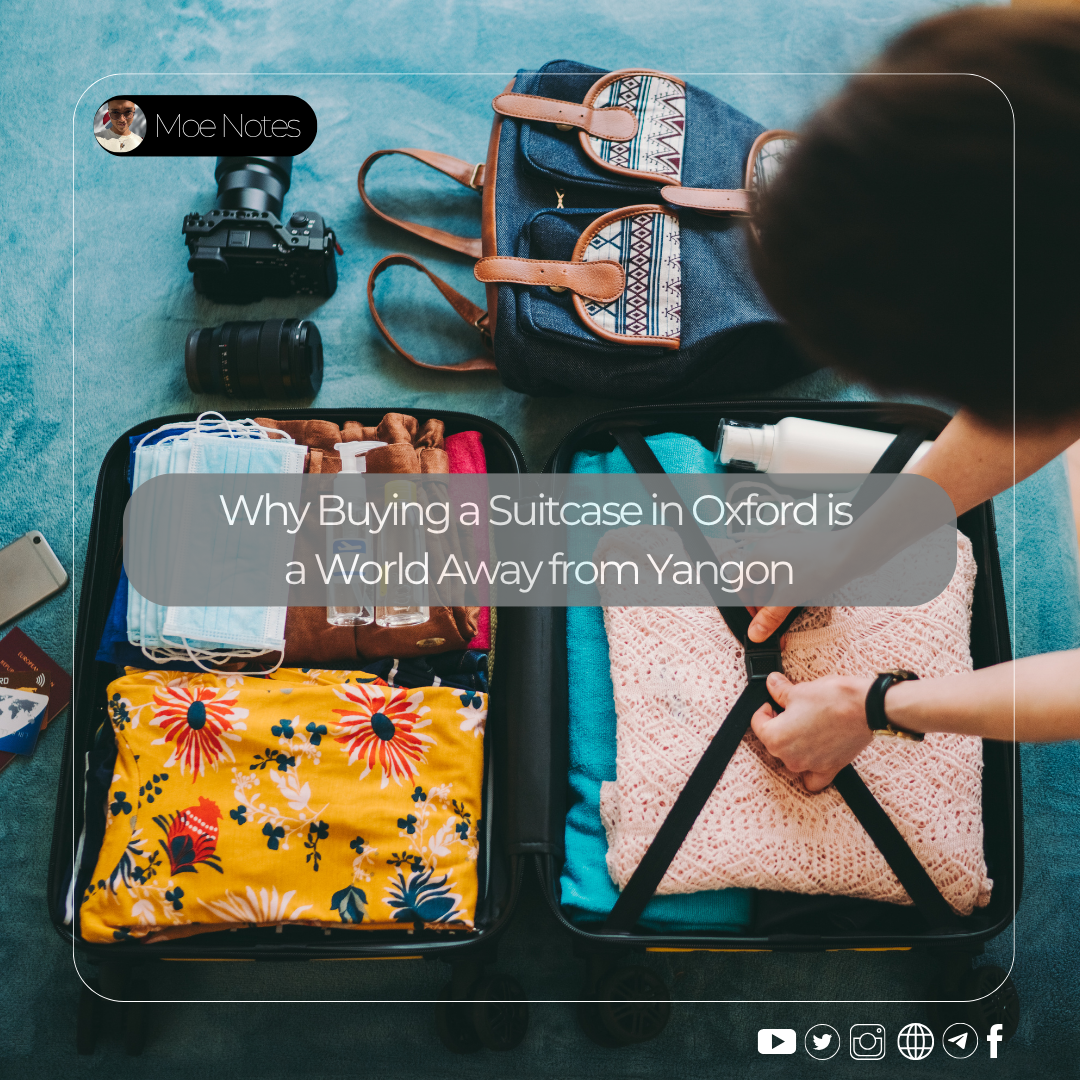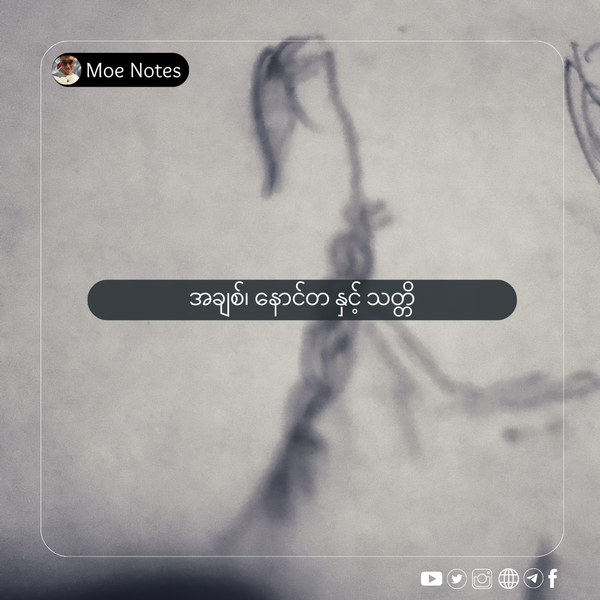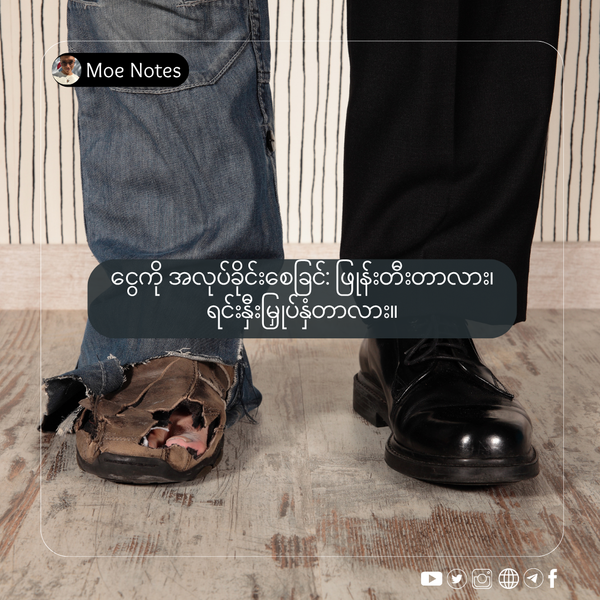Why Buying a Suitcase in Oxford is a World Away from Yangon

This article is also available in [Burmese]
Before I tackle another big topic, here’s a quick thought from my day. I went shopping today for some things I needed for the house. Since I was out and about, I took a detour to visit the cemeteries over in Botley. Then the rain started, so I headed for two places I’ve been meaning to visit for a while. The first was Decathlon, a store that sells all sorts of sporting goods—not just clothes like Nike or Adidas, but more specialized equipment for more extreme sports. I was mainly there for a new bicycle seat. And it was there that a thought struck me about the state of online shopping.
Part 1: The Five Frustrations of Shopping in Myanmar
When we buy things in Myanmar, we’re used to a certain process. If you want everything in one place, you go to City Mart or Junction City. If you want wholesale prices, you head downtown. For truly specific or niche products, you have to go online.
But this is where the problems begin. Let’s say I want to buy a specific suitcase—a certain brand, size, and color I found online. Official brands rarely sell directly in Myanmar; they are imported by distributors like City Mart. So, when I can't find it there, I search online and find countless luggage shops on Facebook. The products and sellers are all different. And it’s almost impossible to know if a product is genuine or fake. Yes, there are QR codes and barcodes, but those can be faked too.
"A suitcase is a suitcase, what's the difference between real and fake?"
There is a huge difference, and anyone who has had their luggage mishandled by an airline knows it. Real quality shows in the weight, the flexibility of the material, the removable parts, the warranty, the customer service, and whether the lock is airline-compliant. The bottom line is: it is incredibly difficult to distinguish real from fake.
This leads to a cascade of other frustrations that define the shopping experience back home.
1. The Customer Service Black Hole: 'All Sales Are Final'
There is virtually no after-sales support. If you get a product home and realize it’s broken or damaged, you cannot return it. Refunds are not given, and exchanges are rare. This is why sellers always insist you check everything in the store before you leave. If you don't understand how to use a device, or need help with a warranty, finding information is extremely difficult. Manuals are often insufficient, and online video tutorials or proper documentation are scarce.
2. The Endless Search: Wasting a Day to Find One Item
There is no reliable, centralized online shopping system. To get something, you have to physically go to a shop. This might seem normal, but it's not an efficient way to live. You search for an item online, go to the shop you think has it, and if they don't, you go to the next one, and the next. The process is anything but convenient. I’ve had times where I’ve had to travel all over the city just for a single plastic container.
3. The Photo vs. Reality Problem
Everyone knows this one. The item in the photo looks nothing like what arrives. This happens when the market is flooded with dishonest third-party sellers and product listings are incomplete, lacking precise dimensions or specifications.
4. The Price vs. Quality Trap: You Get What You Pay For
To be fair, the buyer also plays a role in this system. People often want a product worth lakhs for just a few thousand kyats. They want the absolute best quality for the absolute lowest price. When it seems possible, they’ll buy it. But in reality, you almost always get what you pay for. Yes, some things are overpriced, but generally, this rule holds true.
Part 2: The UK Consumer Experience - A Blueprint for How It Should Be
I want to tell you how I shop here in Oxford, partly because I wish for this system to one day exist in Myanmar.
If I want to buy a suitcase, I search online for "luggage." From the results, I filter by my budget. I can see detailed specifications—weight, size, materials, texture—all from the website. I can even see if a nearby physical store has it in stock. I can have it shipped from anywhere in the world and trust that the price is fair for the quality I'm receiving.
And here is the most important part: consumer rights are guaranteed.
- Hassle-free Returns: If I'm not happy with it, I can return it, no questions asked (unless it's my fault).
- Easy Refunds: I can drop the return package at a local shop or post office, and the money is automatically refunded to my bank account once the item is received.
- Reliable Support: If I have a question, I can easily contact the original company by phone or email.
- Efficiency and Trust: The payment is secure, the delivery is reliable (they can even leave it in a safe place if I’m not home), and the entire process is fast and requires minimal human interaction.
When I see this clear and simple process, I can't help but imagine how much time, money, and energy it saves. Of course, some things are way too expensive than what they should be. A combination of the ease of shopping in the UK with the price tag as low as Burma would be, well, nice.
Conclusion: This Isn't a Criticism, It's a Hope for the Future
This is just a feeling I had today. I am not criticizing Myanmar from my position abroad; I know that with the current situation, nothing can be changed right now. But it is a thought for the future.
One day, I am certain there will be an "Amazon Myanmar." There will be an "Apple Myanmar." I still hope to see the day when Amazon Prime vans are navigating the narrow streets of Latha and Lanmadaw, searching for a place to park while making their deliveries.



